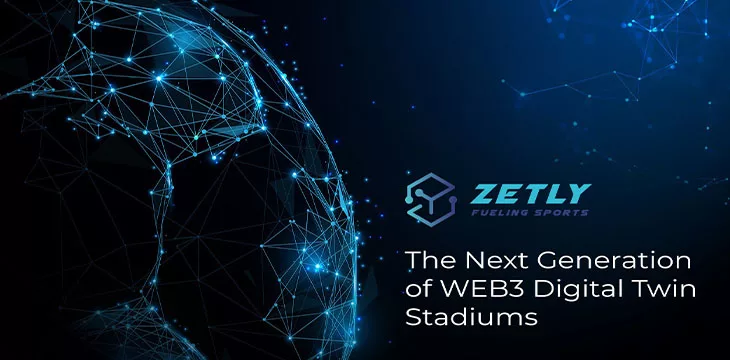|
Getting your Trinity Audio player ready...
|
This is a guest post contribution from Michał Glijer, CEO and founder of Zetly All in One Sport Fan Engagement NFT Platform.
As the CEO of Zetly All in One Sport Fan Engagement platform, which together with Robert Rice of Transmira Omniscape, a company that specializes in implementing this innovative technology, I am thrilled to share with you the development of the next generation of Web3 Digital Twin Stadiums.
With this revolutionary technology, stadiums are no longer just a physical space for fans to gather and watch their favorite sports team play. They have become fully immersive and interactive experiences, accessible to anyone, anywhere in the world.
Digital Twin technology is the concept of creating a virtual, digital replica of a physical object or space. Our technology provides Full Photorealistic and 3D City-scale digital twins of any location, venue, or place, fully integrated and synchronized between mobile AR and desktop 3D/VR. In the case of stadiums, every aspect of the venue can be replicated digitally, from the seats to the scoreboard and even the field itself. By creating a virtual version of the stadium, we can develop an entirely new way for fans to engage with their favorite teams and players.
Imagine being able to access a Digital Twin Stadium from the comfort of your own home. You can choose your seat, watch the game from different angles, and even interact with other fans watching the game in the virtual stadium. With the power of Web3 and our patented technology, we can make this a reality.
Web3 technology enables the creation of decentralized applications that operate on blockchain networks. By leveraging this technology, we can create a secure and transparent environment where fans can purchase tickets, merchandise, and even make donations directly to their favorite teams. With Web3, there is no need for intermediaries, such as ticket brokers or merchandise sellers, which means lower costs and greater transparency for everyone involved.
Another exciting aspect of Digital Twin Stadiums is the potential for new revenue streams. In addition to ticket sales and merchandise, stadiums can now offer virtual advertising and sponsorship opportunities. By incorporating digital ads into the virtual stadium, brands can reach a global audience without physical signage. And with the ability to track engagement and clicks, advertisers can see a clear ROI on their investment.
Digital Twin Stadiums also have significant benefits for sports teams and institutions. By creating a virtual replica of the stadium, teams can use it for training and strategy sessions. Coaches can use the virtual environment to analyze past games and simulate different scenarios to prepare for future matches. And with the ability to track player movements and actions, teams can use the data to optimize player performance and prevent injuries.
Another key benefit is the ability to expand the fan base beyond the physical stadium. By providing fans with a fully immersive and interactive experience, clubs can reach fans who are unable to attend games in person. This can include fans worldwide, who can access the virtual stadium from anywhere with an internet connection. By expanding the fan base, clubs can grow their brand and generate new revenue streams.
Finally, our Digital Twin solution can also provide clubs with cost savings. By reducing the need for physical infrastructure and staff, clubs can lower their operating costs. This can include savings on ticketing, concessions, and merchandise, as well as staffing costs associated with managing a physical stadium.
In conclusion, in my opinion, Digital Twin Stadiums represent a major step forward in the world of sports. They offer fans an entirely new way to engage with their favorite teams and players while providing teams and institutions with new revenue streams and training opportunities.
Simply together with the whole Zetly and Transmira Team, we are excited to see what the future holds for Web3 Digital Twin Stadiums and how they will transform the world of sports.
About the Author
Michał Glijer is the CEO and founder of Zetly All in One Sport Fan Engagement NFT Platform. An entrepreneur with 20 years of experience in marketing, project management and investments, Michał started his career as the founder of the More Than Explore Event Agency dealing with the organization of business meetings and events for the largest companies in Poland and Europe. He has extensive experience in strategy, partnerships and innovation in the marketing services sector.
Watch: Web3 creates more equitable business model for all

 02-20-2026
02-20-2026 




